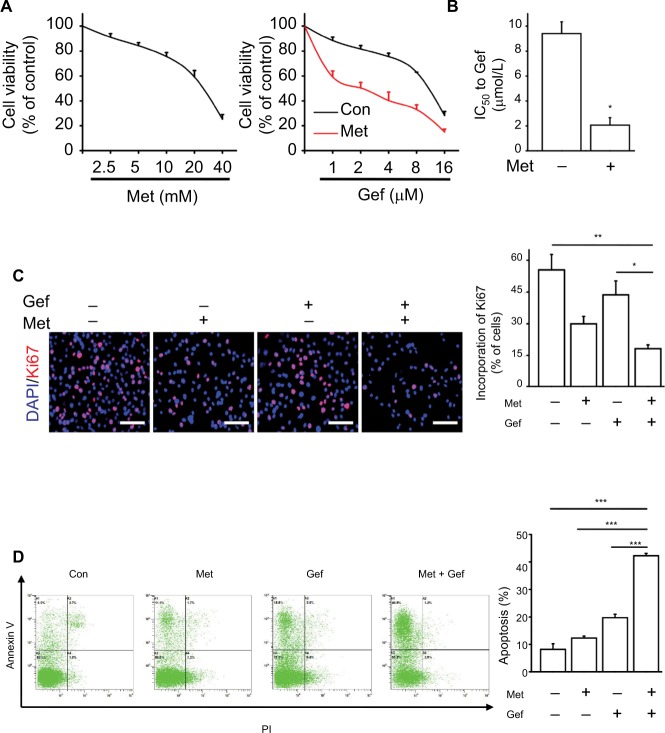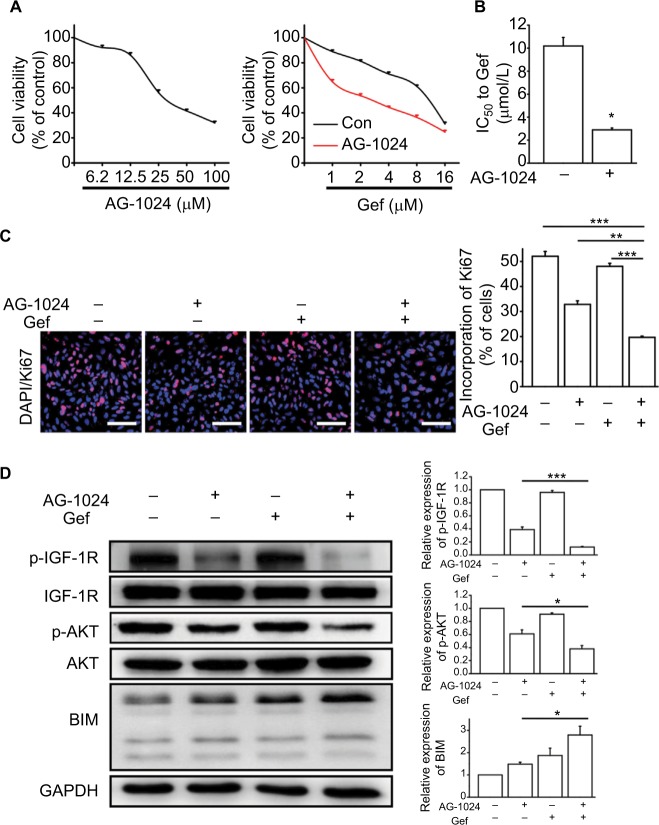Combined treatment with metformin and gefitinib overcomes primary resistance to EGFR-TKIs with EGFR mutation via targeting IGF-1R signaling pathway.
IF 5.3
Q1 MEDICINE, RESEARCH & EXPERIMENTAL
Biologics : Targets & Therapy
Pub Date : 2018-08-20
eCollection Date: 2018-01-01
DOI:10.2147/BTT.S166867
引用次数: 28
Abstract
Aim Although EGFR tyrosine kinase inhibitors (TKIs) have shown dramatic effects against sensitizing EGFR mutations in non-small cell lung cancer (NSCLC), ~20%–30% of NSCLC patients with EGFR-sensitive mutation exhibit intrinsic resistance to EGFR-TKIs. The purpose of the current study was to investigate the enhanced antitumor effect of metformin (Met), a biguanide drug, in combination with gefitinib (Gef) in primary resistant human lung cancer cells and the associated molecular mechanism. Experimental design H1975 cell line was treated with Met and/or Gef to examine the inhibition of cell growth and potential mechanism of action by using 3-(4,5-dimethylthiazol-2-yl)-2,5-diphenyltetrazolium bromide (MTT), Ki67 incorporation assay, flow cytometry analysis, small interfering RNA technology, Western blot analysis and xenograft implantation. Results Insulin-like growth factor-1 receptor (IGF-1R) signaling pathway was markedly activated in EGFR-TKI primary resistant H1975 cells as compared to EGFR-TKI acquired resistance cells (PC-9GR, H1650-M3) and EGFR-TKI sensitivity cells (PC-9, HCC827). Inhibition of IGF-1R activity by AG-1024 (a small molecule of IGF-1R inhibitor), as well as downregulation of IGF-1R by siRNA, significantly enhanced the ability of Gef to suppress proliferation and induce apoptosis in H1975 cells via the inhibition of AKT activation and subsequent upregulation of Bcl-2-interacting mediator of cell death (BIM). Interestingly, the observation showed that Met combined with Gef treatment had similar tumor growth suppression effects in comparison with the addition of AG-1024 to therapy with Gef. A clear synergistic antiproliferative interaction between Met and Gef was observed with a combination index (CI) value of 0.65. Notably, IGF-1R silencing mediated by RNA interference (RNAi) attenuated anticancer effects of Met without obviously resensitizing H1975 cells to Gef. Finally, Met-based combinatorial therapy effectively blocked tumor growth in the xenograft with TKI primary resistant lung cancer cells. Conclusion Our findings demonstrated that Met combined with Gef would be a promising strategy to overcome EGFR-TKI primary resistance via suppressing IGF-1R signaling pathway in NSCLC.



二甲双胍联合吉非替尼通过靶向IGF-1R信号通路克服了EGFR突变的EGFR- tkis的原发性耐药。
目的:虽然EGFR酪氨酸激酶抑制剂(TKIs)在非小细胞肺癌(NSCLC)中显示出对EGFR突变增敏的显着作用,但约20%-30%的EGFR敏感突变的NSCLC患者对EGFR-TKIs表现出内在抗性。本研究旨在探讨双胍类药物二甲双胍(metformin, Met)联合吉非替尼(ge非替尼,Gef)对原发性耐药人肺癌细胞的增强抗肿瘤作用及其分子机制。实验设计:采用3-(4,5-二甲基噻唑-2-酰基)-2,5-二苯基溴化四唑(MTT)、Ki67掺入实验、流式细胞术、小干扰RNA技术、Western blot分析和异种移植物植入等方法,对H1975细胞株进行Met和/或Gef处理,研究Met和/或Gef对细胞生长的抑制作用及其潜在作用机制。结果:与EGFR-TKI获得性耐药细胞(PC-9GR, H1650-M3)和EGFR-TKI敏感细胞(PC-9, HCC827)相比,EGFR-TKI原代耐药细胞H1975中胰岛素样生长因子-1受体(IGF-1R)信号通路明显激活。AG-1024 (IGF-1R抑制剂的小分子)抑制IGF-1R活性,以及siRNA下调IGF-1R,通过抑制AKT激活和随后上调bcl -2相互作用的细胞死亡介质(BIM),显著增强Gef抑制H1975细胞增殖和诱导凋亡的能力。有趣的是,观察显示Met联合Gef治疗与在Gef治疗中添加AG-1024相比具有相似的肿瘤生长抑制效果。Met与Gef具有明显的协同抗增殖作用,联合指数(CI)为0.65。值得注意的是,通过RNA干扰(RNAi)介导的IGF-1R沉默可以减弱Met的抗癌作用,但不会明显使H1975细胞对Gef重新敏感。最后,基于met的联合治疗有效地阻断了TKI原发性耐药肺癌细胞异种移植物的肿瘤生长。结论:我们的研究结果表明Met联合Gef将是一种有希望的策略,通过抑制NSCLC中IGF-1R信号通路来克服EGFR-TKI的原发性耐药。
本文章由计算机程序翻译,如有差异,请以英文原文为准。
求助全文
约1分钟内获得全文
求助全文
来源期刊

Biologics : Targets & Therapy
MEDICINE, RESEARCH & EXPERIMENTAL-
CiteScore
8.30
自引率
0.00%
发文量
22
审稿时长
16 weeks
 求助内容:
求助内容: 应助结果提醒方式:
应助结果提醒方式:


